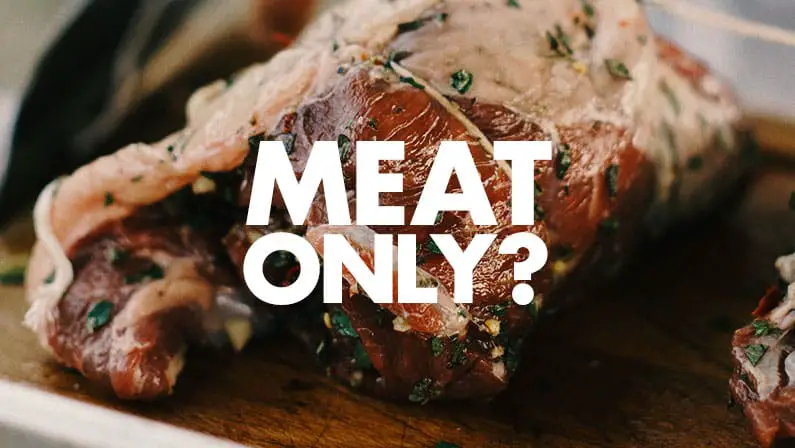Can Humans Survive By Eating Only Meat and Animal Products?

As an Amazon Associate we earn from qualifying purchases made on our website. If you make a purchase through links from this website, we may get a small share of the sale from Amazon and other similar affiliate programs. You can read our complete legal information for more details. By using this site, you agree the information contained here is for informational purposes only. For specific medical questions, consult your doctor. NO information on this site should be used to diagnose, treat, prevent or cure any disease or condition.
The vegan and vegetarian propaganda has done a great job of misguiding the average person, myself included, and I suppose if you asked random people on the street, “could you survive off a solely plant-based diet?”, they would probably say yes. But what if you asked, “can you survive off a meat and animal product only diet?” The response would most likely be no and that you will have a heart attack within a few years.
What if that wasn’t the case and that a plant-based diet is actually more dangerous and less healthy.
What if a meat-only diet is possible and that some people thrive on it? In this post, we will find out how and why a totally meat-based diet is possible to live on.
First, let’s take a look at some major meat eaters the Masai Warriors of Africa, the Inuits of the arctic, and the Anderson Family of the US.

Masai Warriors
Historically humans living off only animal foods and meat is not a new thing. There were and are tribes today that eat predominantly meat-based diets. (1)
Weston A Price wrote about his findings in his book, “Nutrition and Physical Degeneration”. While in Africa he observed the Masai warriors and found they didn’t eat plant-based food.
These warriors were nomadic and traveled with cows which in turn provided them everything they need to survive, along with hunting and eating wild animals. Their diet included meats, organ meats, blood, and milk all of which provided them all the nutrition they would need.
Price also compared these nomads to the “civilized world” and stated that when compared they had less heart disease, cancer, or dental problems not to mention their mental health was superb as they were happy, friendly, and intelligent.
The kicker is that when a member of the Masai tribe moved to a modern city and adapt that city way of eating than their health would crumble and end up getting diet-based diseases. (2)

Inuits
Another group of people worth mentioning that ate a predominantly meat-based diet is the Inuits who’ve lived in the cold and barren Arctic for thousands of years.
Because of the environment which does not produce fruits and veggies, they are forced to eat meat, lots of meat. Their diet was primarily fish and seal. And the like the Masai warriors they were sure to eat all of the animal, from the brains to the organs, nothing was wasted.
The Inuit had low reports of cancer or heart disease and their dental health was optimal. This is pre-1920 before a carbohydrate-rich Western Diet was introduced. (3)
Back in the early 1900’s Dr. Vilhjalmur Stefansson, Arctic explorer, professor, and meat-eating advocate lived with the Inuits for some time and also reported that their high meat diet allowed them to thrive and acquire less diseases than those who are on a modern Western diet. (4)

The Anderson Family: All Meat Eaters
I came across this interesting article, “Anderson family: On meat diet for 17 years” which introduces us to the Anderson Family who eat a zero carb diet and have been doing it for over two decades.
Their reasons to switch to an all-meat diet were due to health as Mrs. Anderson suffered from Lyme disease and discovered that an all-meat diet lessened her symptoms.
When she figured that out her family did research on an all-meat diet/zero carb diet and concluded it was most beneficial and now the entire family has adopted that practice, including their two children.
They eat primarily beef, fatty ribeyes, once a day at dinner time. The dinner servings are large and described as a Thanksgiving Meal every night. They don’t even salt their meat and drink only water.
However, Carnivore Diet doctors and advocates like Dr. Paul Saladino author of, “The Carnivore Code”, usually recommend 5-10 grams of salt per day. You can read more about salt intake with this article:
When interviewed Mr. Anderson mentioned, “My body and mind are more active and responsive at 56 than when I was in my 20s.”

Clinical Observations from Dr. Natasha Campbell-McBride
While reading “Vegetarianism Explained” by Dr. Natasha Campbell-McBride I found that some of her patients have adapted a meat-only diet as a necessity to relieve symptoms associated with Crohn’s disease, ulcerative colitis, autoimmune disease, Lyme disease, and even mental illness.
A portion of her patients eat what’s called the No-Plant GAPS Diet which consists primarily of meat, organs, animal fats, meat stock, bone broth, fish, fresh eggs, fermented raw dairy, kefir, sour cream ghee, butter cheese and yogurt, do very well. Both adults and children.
She even states that, “In some cases of severe ulcerative colitis and Crohn’s disease this is the only diet that allows patients to be well, stop all medication, reach their normal body weight, eliminate all digestive symptoms and function to their full capacity.”
Some of her patients have been on this all animal product diet for 3 years or longer and have no desire to change as it’s been so beneficial to their health and wellbeing.
In fact, some have tried to add some fruits and veggies back into their diet but found their symptoms would return.
Dr. Campbell-McBride goes on to state, “based on my clinical experience, I have no doubt that human beings can live very healthily without plant foods at all!” (5)
But this is all anecdotal evidence?
The truth of the matter, yes, this is all based on anecdotal evidence and interviews without a controlled environment or study. But this is what we have to go with as there isn’t a study that shows the full lifespan of meat-eating humans.
Hopefully, soon there will be a study that is able to conclude that humans can live off nothing but animal meat and products but I wouldn’t hold your breath as it would be costly and ethically wrong.
We dove deep with an article on nutrition science that debunks epidemiology (as you will see below also) and explains the challenges and biases of food science. It’s an eye-opener.

What about all the studies showing meat is bad for you?
These studies are out there and they come up with their conclusions based off of epidemiology.
Epidemiology is the study and analysis of the distribution (who, when, and where) and determinants of health and disease conditions in defined populations.
The reason these studies are not accurate is because you can look at meat eaters and see that they don’t live as long as vegetarians or get heart disease at a higher percentage. The challenge is that the meat-eater group could also be eating sugar, soda, diet soda, doing drugs, not exercising, or any other unhealthy habits. The data is based on food questionnaires!
These studies can’t prove causation and anybody that says so is not being truthful. In fact, you will find that some of these studies are agenda-driven and conducted by pro-vegan or pro-vegetarian researchers and funded by biased food producers. The data is easy to cherry-pick and create conclusions that fit your narrative.
But don’t take my word for it check out Dr. Georgia Ede’s explanation:
In fact here is a study that is often used to throw dirt in the face of meat eaters conducted by the World Health Organization called “Carcinogenicity of consumption of red and processed meat”.
This report is a prime example of the misuse of an epidemiological study to sway the masses against the consumption of meat. The groups of people who developed disease ate meat but these groups of people could have had sugar, processed foods, and vegetable oils in their diets not to mention consumption of drugs and alcohol.
Crazy enough, there isn’t a human “clinical study” showing that eating red meat is a health problem. If you find one hit me up.

A Plant Based Diet and Planet Lie?
Most recently a study came out regarding food sustainability and suggestions for a healthy planet and people titled “Food in the Anthropocene: The EAT-Lancet Commission on Healthy Diets from Sustainable Food Systems.” This study is a prime example of epidemiology and how you can manipulate data to push your agenda.
Could this report have an agenda and bias?
Perhaps, as EAT, the ones making the study possible, was founded by a billionaire vegan and animal rights activist named Gunhild Stordalen. Let’s also mention that EAT helped launch FRESH, (Food Reform for Sustainability and Health), which is partnered with 40 corporations that are plant food-driven like Barillo, Pepsi, and Kelloggs, just to name a few.
The researchers pooled data and took 3 years to come up with a solution to the planet’s apparent problem of eating too much meat and lack of sustainability.
Their main conclusion is to, on a worldwide scale, minimize the amount of meat people eat and to add grain, legumes, and nuts. Once again you will see that all their data is based on questionnaires and not clinical trials.
This report is easy to dispute and Dr. Georgie Ede has done another great job of breaking it down and providing an expert response.
You should really check out her article titled “EAT-Lancet’s Plant-Based Planet: 10 Things You Need to Know”.
That article is a real eye-opener and points out the faults of an agenda-driven study based on epidemiology.

Human Adaptability
Breaking it down over time the human body can pretty much adapt to an all plant-based diet but with it comes consequences due to lack of essential vitamins, amino acids and nutrients that are not found in the plant kingdom and if they are our human bodies can’t utilize them or digest them properly. (6)
Eventually, the body will succumb to disease and eventual death if not given animal-based products or supplements. (7)
But if you turn the equation around and take a look at a human on an all-animal product diet you will most likely find that the amount of health-related problems is not near as detrimental as to those of the all plant-based dieter.
The all-plant diet is nutrient deficient while the all animal product diet is nutrient-dense, highly bioavailable, and potentially less toxic.
A Caveat for the All Meat Eater
It should also be mentioned that in order to thrive on an all-meat diet without health complications one would need to eat heavy amounts of fat, and include organ meat as mentioned in Dr. Paul Saladinos’ book, “The Carnivore Code” where he believes a nose-to-tail diet is phenomenal.
Organ meats like heart, kidneys, and liver are the most nutrient-dense products humans are able to consume. Some people even add desiccated organ capsules to their diet, liver being a popular one. Some people even add desiccated organ capsules to their diet, liver being a popular one. In fact here is a great article I wrote which goes over the benefits of adding liver to your diet. Check out:
Should You Add Liver to your Paleo, Keto or Carnivore Diet?
You can also watch this video on how to make beef and chicken liver pate!
What about Carbs?
Some people say high carbs are also essential but let’s take a look at what happens without them. Essentially the liver breaks down all the protein from the meat you are eating and turns it into glycogen. The fat is also used and turned into ketones which are then used as energy and brain fuel.
So living without carbohydrates is possible but what about ketosis and weightlifting?
- Are Carbs Required For Muscle Gain? Carnivore Diet Carbs Advice
- Does The Carnivore Diet Put You in Ketosis? Does Protein Take You Out?
Conclusion:
As you can see humans have lived and thrived off of meat over many thousands of years but the narrative over the past 50 or more years has insisted meat is bad for you.
However, now that more people are switching to an all-meat diet due to health reasons and wanting more energy we can see that it is possible to live on an all-meat diet. Also, the studies recommending grains and plant-based nutrition are faulty and not conclusive. Based on this what do you think about the question, “Can We Survive on an All-Meat Diet?”
My opinion is yes, but I’m not a doctor and you should do further research and buy these books to help you out:
My other opinion is that an all-plant diet can be very bad for your health. Just saying.
If you are curious about the carnivore diet and looking to get motivated you can hit me up at MeatRX as I am a Carnivore Diet Coach. Book me here.
Disclaimer: I’m not a doctor. Consult with and ask your doctor about any diet or medical-related questions. No information on this site should be used to diagnose, treat, prevent, or cure any disease or condition.
Resources
- Masai and Inuit High-Protein Diets: A Closer Look
- Nutriction and Physical Degeneration by Weston A. Price, DDS
- The introduction of refined carbohydrates in the Alaskan Inland Inuit diet may have led to an increase in dental caries, hypertension and atherosclerosis
- Adventures in Diet by Arctic Explorer Vilhjalmur Stefansson
- Vegetarianism Explained: Making an Informed Decision By Dr. Natasha Campbell-McBride
- The Hidden Dangers of the Vegan Movement
- Health Effects of Vegan Diets



